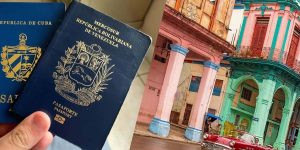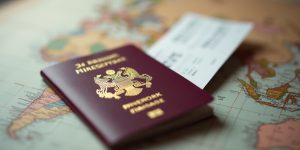Flying nonstop across the world has become a reality thanks to modern aircraft like the Airbus A350 and Boeing 787, capable of covering incredible distances without refueling. These ultra-long-haul routes, some lasting over 18 hours, connect distant cities such as New York to Singapore and Auckland to New York, redefining global travel.
In this article, we’ve compiled the Top 13 Longest Flights in the World 2025, complete with routes, airlines, flight durations, and onboard experiences. Whether you’re a frequent flyer or an aviation enthusiast, this updated guide covers everything about today’s most extreme nonstop journeys.
Top 13 Longest Flights In The World
These routes represent aviation’s pinnacle, connecting distant cities with non-stop flights. Airlines use advanced aircraft technology to make these marathon journeys possible and comfortable.
| Route | Airline | Duration |
|---|---|---|
| New York (JFK) → Singapore (SIN) | Singapore Airlines SQ23 | ~18 h 50 m |
| Newark (EWR) → Singapore (SIN) | Singapore Airlines SQ21 | ~18 h 45 m |
| Los Angeles (LAX) → Singapore (SIN) | Singapore Airlines SQ37 | ~17 h 40–50 m |
| Perth (PER) → London (LHR) | Qantas QF9 | ~17 h 45 m |
| Dallas (DFW) → Melbourne (MEL) | Qantas QF22 | ~17 h 35 m |
| New York (JFK) → Auckland (AKL) | Qantas / Air New Zealand | ~17 h 30 m |
| Auckland (AKL) → Doha (DOH) | Qatar Airways QR921 | ~17 h 15 m |
| Perth (PER) → Paris (CDG) | Qantas QF33 | ~17 h 15 m |
| Auckland (AKL) → Dubai (DXB) | Emirates EK449 | ~17 h 5 m |
| Johannesburg (JNB) → Atlanta, GA (ATL) | Delta Air Lines DL201/200 | ~16 h 55 m |
| Shenzhen (SZX) → Mexico City (MEX) | China Southern CZ8031 | ~16 h 20 m |
| Auckland (AKL) → New York (JFK) | Air New Zealand / Qantas | ~16 h 15 m |
| Dubai (DXB) → San Francisco (SFO) | Emirates EK225/226 | ~15 h 50 m |
These flights showcase modern aviation’s ability to connect global destinations with minimal stops, revolutionizing international travel and business connectivity.
1. New York (JFK) → Singapore (SIN)
| Aircraft | Airbus A350-900ULR |
| Distance | ~9,542 miles |
| Average Fare | $1,100 – $9,800 |
Singapore Airlines SQ23 crosses 12 time zones during its 18-hour, 50-minute journey, offering business and premium economy configurations. Multiple meal services and specialized cabin lighting help passengers adjust to the significant time differences, minimizing the effects of jet lag.
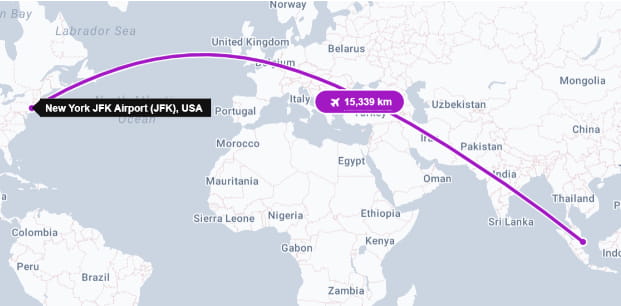
Wi-Fi connectivity and extensive entertainment systems keep passengers engaged throughout the marathon flight. Daily operations make it accessible for business travelers, while sunrise appears twice during the westbound journey across multiple continents.
2. Newark (EWR) → Singapore (SIN)
| Aircraft | Airbus A350-900ULR |
| Distance | 9,542 miles |
| Average Fare | $1,000 – $8,000 |
Operating since 2018, Singapore Airlines SQ21 covers 9,539 miles across 10-12 time zones in approximately 18 hours and 45 minutes. Advanced air filtration systems and cabin pressure optimization help reduce passenger fatigue during extended flight durations.
Premium cabin configurations feature lie-flat seats and personalized service designed specifically for ultra-long route comfort. Daily frequency provides consistent connectivity between the Northeast United States and Southeast Asia’s major hub.
3. Los Angeles (LAX) → Singapore (SIN)
| Aircraft | Airbus A350-900 |
| Distance | 8,771 miles |
| Average Fare | $900 – $7,000 |
Singapore Airlines operates five weekly flights crossing 15 time zones during the 17-hour 40-minute Pacific journey. Full-service meals and premium cabin amenities ensure passenger comfort throughout the extended flight duration across the vast Pacific Ocean.
Flight timing allows optimal connections to other Asian destinations from Singapore’s hub. West Coast departure provides convenient access for travelers from California, Nevada, and surrounding states seeking direct Asian connectivity.
4. Perth (PER) → London (LHR)
| Aircraft | Boeing 787-9 Dreamliner |
| Distance | 9,024 miles |
| Average Fare | $2,000 – $16,000 |
Qantas QF9 operates daily, crossing 7 time zones during the 17-hour 45-minute journey from Australia’s west coast to Europe. Boeing 787-9 Dreamliner technology reduces jet lag effects through improved air quality and optimized cabin pressure management.
Arriving in London in the morning facilitates a better adjustment to local time zones. A direct connection eliminates traditional Middle Eastern stopovers, providing seamless travel between Australia and the UK for both business and leisure travelers. Business travelers should be aware of the different types of visas for international business travel planning.
5. Dallas (DFW) → Melbourne (MEL)
| Aircraft | Boeing 787-9 Dreamliner |
| Distance | 9,004 miles (≈ 14,493 kilometers) |
| Average Fare | $1,700 – $26,000 |
Qantas QF22 operates three weekly flights crossing 16 time zones during its 17-hour, 35-minute trans-Pacific duration. QF22’s trans-Pacific flight provides full entertainment options through seatback AVOD and personal-device streaming on supported aircraft.
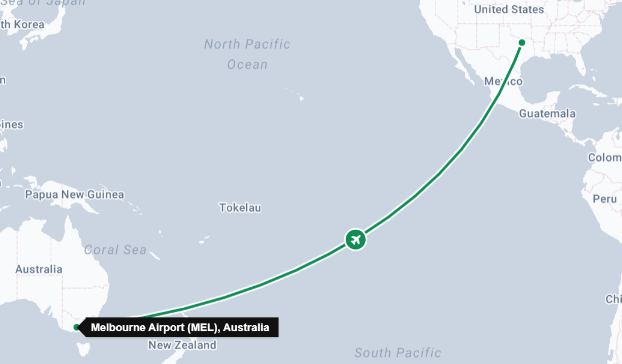
Advanced aircraft technology ensures passenger safety during the extended over-water flight path. Connection facilitates tourism between North America and Australia’s cultural capital, Melbourne. While Melbourne can be pricey, explore the cheapest cities in the world to live in for more budget-friendly travel options.
6. New York (JFK) → Auckland (AKL)
| Aircraft | Boeing 787-9 Dreamliner |
| Distance | 8,842 miles |
| Average Fare | $1,100 – $7,000 |
Air New Zealand operates three weekly flights that cross 17 time zones during the 17-hour, 35-minute journey. Premium cabin configurations and features, such as seatback touchscreens, movies, TV shows, music, and in-flight Wi-Fi, provide passengers with comfort during the lengthy flight between North America and New Zealand.
Specialized meal services and cabin lighting systems help passengers adjust to significant time zone changes. The connection links North America’s financial center with New Zealand’s largest city.
7. Auckland (AKL) → Doha (DOH)
| Aircraft | Airbus A350-1000 |
| Distance | 9,041 miles |
| Average Fare | $900 – $5,000 |
Qatar Airways QR921 operates daily, crossing 8 time zones during the 17-hour, 15-minute flight duration. The A350-1000 features advanced cabin technology and spacious seating configurations designed to enhance passenger comfort during extended flights.
Flight timing allows connections through Qatar’s hub to numerous European and African destinations. Connection provides New Zealand travelers with convenient access to Middle Eastern and European markets through Doha’s modern facilities.
8. Perth (PER) → Paris (CDG)
| Aircraft | Boeing 787-9 Dreamliner |
| Distance | 8,878 miles |
| Average Fare | $1,200 – $6,000 |
Qantas operates three weekly flights crossing 7 time zones during the 17-hour, 15-minute journey. Boeing 787 fuel efficiency makes the long route economically viable for regular operations between Australia and Europe.
Direct connection eliminates traditional stopovers between Australia and Europe’s cultural capital, reducing total travel time and simplifying transit logistics. The route highlights the growing demand for seamless intercontinental travel supported by next-generation aircraft capabilities.
9. Auckland (AKL) → Dubai (DXB)
| Aircraft | Airbus A380-800 |
| Distance | 8,834 miles |
| Average Fare | $1,000 – $5,500 |
Emirates EK449 operates daily, using the world’s largest passenger aircraft, which crosses eight time zones during the 17-hour 5-minute flight. The A380 offers multiple cabin classes and extensive amenities to ensure passenger comfort during extended journeys.
The route provides a vital link between New Zealand and over 140 global destinations via Emirates’ Dubai hub, streamlining international travel with efficient connections and world-class in-flight services.
10. Shenzhen (SZX) → Mexico City (MEX)
| Aircraft | Airbus A350-900 |
| Distance | 8,789 miles |
| Average Fare | $800 – $4,500 |
China Southern CZ8031 operates twice weekly, crossing 14 time zones during the 16-hour, 20-minute journey. The flight connects Asia directly with Latin America, facilitating increased trade and cultural exchange between the two rapidly growing economic regions.
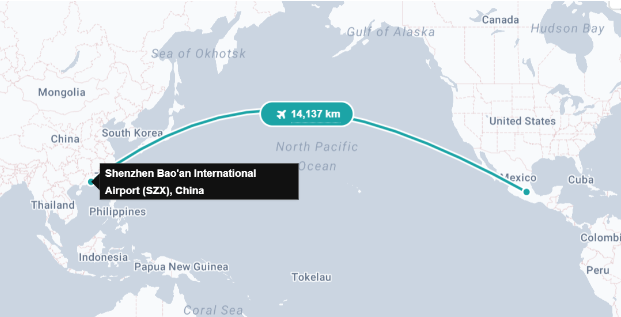
Advanced aircraft technology ensures passenger safety and comfort during the transcontinental journey across the Pacific Ocean. Growing aviation connections between Asia and the Americas reflect increasing business relationships between both regions.
11. Johannesburg (JNB) → Atlanta, GA (ATL)
| Aircraft | Airbus A350-900 (359) |
| Distance | ~8,448 miles / 13,596 km |
| Average Fare | $625 (~₹52,412) |
Delta Air Lines operates a daily service between Johannesburg and Atlanta, covering over 8,400 miles.
The Airbus A350-900 aircraft features Delta One business class and premium economy cabins, designed for comfort on this long-haul journey. Passengers can enjoy multiple meal services, advanced in-flight entertainment, and Wi-Fi connectivity.
The flight crosses multiple time zones, with cabin lighting adjustments and staggered meal schedules to help reduce jet lag, making it suitable for both leisure and business travelers.
12. Auckland (AKL) → New York (JFK)
| Aircraft | Boeing 787-9 |
| Distance | ~8,830 miles / 14,209 km |
| Average Fare | $1,200 |
Air New Zealand launched its nonstop Auckland to New York flight in 2022, with a scheduled duration of around 16 hours and 15 minutes. In 2023, Qantas also started flying this route, offering more options for travelers.
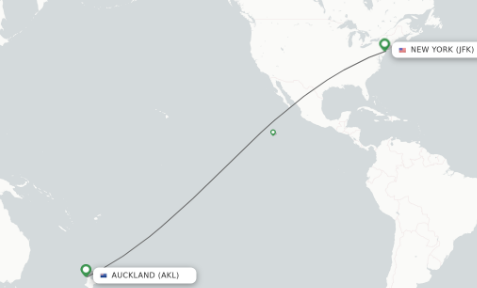
The Boeing 787-9 provides a comfortable journey with business and premium economy cabins. Passengers can enjoy multiple meal services, modern in-flight entertainment, and Wi-Fi.
Cabin lighting and staggered meal schedules help reduce jet lag across multiple time zones, making it suitable for both business and leisure travelers.
13. Dubai (DXB) → San Francisco (SFO)
| Aircraft | Airbus A380-800 |
| Distance | ~8,099 miles / 13,034 km |
| Average Fare | $950 – $8,500 |
Dubai (DXB) → San Francisco (SFO) is one of Emirates’ longest nonstop routes, operated by the luxurious Airbus A380-800. Covering roughly 8,099 miles in about 15 hours and 50 minutes, this flight connects the Middle East to the U.S. West Coast in true Emirates style.
Passengers enjoy spacious cabins, gourmet meals, and onboard Wi-Fi, with first-class suites offering ultimate comfort.
The route operates daily, featuring a smooth polar crossing that showcases breathtaking views.
Emirates’ exceptional service and modern entertainment system ensure travelers experience both comfort and convenience throughout this ultra-long-haul journey.
Safety Parameters Used In Long Flights
Long flights follow strict safety protocols, including crew rest, backup systems, emergency procedures, maintenance, and medical readiness, to ensure safety and reliability during extended operations across multiple time zones.
Key Safety Measures in Long-Haul Flights:
- Flights follow international safety regulations to protect passengers and crew.
- Airlines schedule mandatory rest periods for flight crews.
- Aircraft are equipped with backup systems for critical operations.
- Regular maintenance checks ensure the plane is safe to fly.
- Navigation and communication systems have redundancies for reliability.
- Medical equipment and trained staff are onboard to handle emergencies.
With such lengthy flight durations and complex scheduling, missing these flights can be particularly problematic. Passengers should arrive well in advance and understand what actions to take if they miss their flights.
Future Outlook Of Aviation
Aviation technology continues advancing, enabling even longer non-stop flights with improved passenger comfort and fuel efficiency. New aircraft designs and engine technologies promise to further extend flight ranges.
Airlines are planning routes exceeding 20 hours of flight time, connecting previously unreachable city pairs. These developments will transform global travel patterns and business connectivity in the coming decades.
Qantas Project Sunrise will operate direct, non-stop flights from Sydney to London and New York. These ultra-long-haul routes aim to reduce travel time by up to 4 hours compared to current one-stop flights.
The project uses the Airbus A350-1000, selected for its advanced technology. The first plane is scheduled to arrive in mid-2026, marking a new era in Australian air travel with enhanced passenger comfort.
Conclusion: Singapore Airlines SQ23 Tops the List of Longest Flights in the World 2025
The Singapore Airlines SQ23 route from New York (JFK) to Singapore (SIN) remains the longest flight in the world in 2025, covering nearly 9,500 miles in about 19 hours. These ultra-long-haul flights connect far-off cities nonstop, combining time efficiency with exceptional in-flight comfort.
With advancements in modern aircraft like the Airbus A350-900ULR and improved fuel efficiency, airlines continue to push the limits of distance and endurance. For travelers, these record-breaking flights offer a rare experience, flying across continents and time zones in one seamless journey, with comfort, service, and innovation at their best.
FAQs
Singapore Airlines operates the world’s longest flight, SQ23, from New York’s JFK Airport to Singapore, taking approximately 18 hours and 50 minutes to complete the journey.
The longest flights typically cross between 12 and 17 time zones, depending on the route direction and the geographic path taken across continents and oceans.
Long flights maintain the same safety standards as shorter routes, with additional safety protocols, redundant systems, and enhanced crew training specifically for long-haul operations.
Prices range from $1,200 for economy class to over $8,000 for business class, varying by season, demand, and booking timing for these premium ultra-long-haul routes.
Most flights offer high-speed Wi-Fi connectivity, extensive entertainment libraries, and advanced cabin amenities designed to provide comfort and satisfaction during extended journeys.

